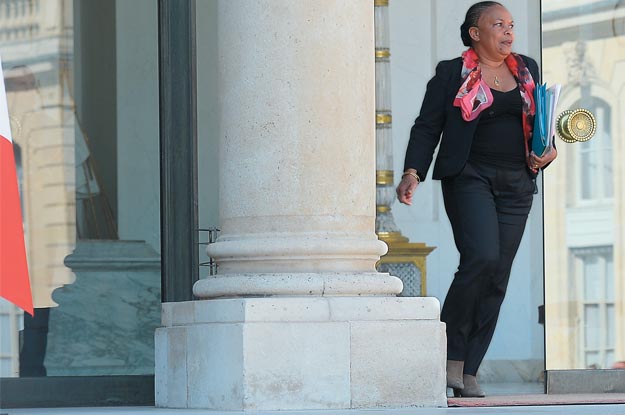Christiane Taubira has been France’s minister of justice since May 2012—a position that has turned her into a symbol for the left and a target for the right. She most famously made headlines during the heated debates in parliament and in the streets, leading to the legalization of same-sex marriage in France in May 2013. As the promoter of a bill establishing equal rights for gays and lesbians, Taubira was confronted with openly racist attacks, ranging from insulting caricatures in extreme right-wing news sources like the Minute to racist epithets on social media and in political meetings.
Born in 1952 into a large family in Cayenne, French Guiana, Taubira first entered politics as a member of the Mouvement guyanais de décolonisation (Guyanese Decolonization Movement) in 1978, after obtaining her economics degree at Paris II-Assas University and additional degrees in sociology and African-American ethnology. In 1981, after socialist candidate François Mitterrand was elected president and pro-independence activism faded in French Guiana, Taubira decided to get involved in French politics.
In 1993, Taubira was elected to the National Assembly for the first time as an independent. She quickly joined the radical left and later drew closer to the Socialist Party.
In the Assembly, Taubira was the driving force behind a law recognizing the slave trade and slavery as a crime against humanity in May 2001. As a direct consequence of Taubira’s legislation, May 10 became a national day of remembrance for the slave trade and slavery. For Taubira, this political achievement was the result of a lifelong goal to promote the historical and cultural heritage of French overseas territories and, particularly, that of her homeland. “My own history is that of slavery, trafficking and marronage, of all forms of resistance,” she recently tweeted.
French citizens became further aware of her charisma and skillful oratory when she was a candidate for the Parti Radical de Gauche (Radical Left Party—PRG) during the first round of the presidential elections in 2002, winning 2.3 percent of the vote.
However, it wasn’t until months of harsh public debate about same-sex marriage in 2012 and 2013 that people took the full measure of Taubira’s determination to fight for the rights of minorities. During the five and a half months of legislative debate on the floor of the National Assembly and the Senate, she continuously delighted—or enraged— parliament members and French citizens with her considerable wit in the face of vicious obstruction. Citing the Spanish poet Antonio Machado, she addressed her male colleagues who had verbally attacked her: “Do not worry, gentlemen, there will always be many women who will look at you and will try to crack the armor to find the tenderness hidden in you.”
Taubira is a rare entity in the French political landscape: a fiercely independent and proud black woman, and a phenomenal public orator. She can cite poetry as easily as the civil or penal code—something she has played a key role in reforming by ensuring that judges can choose alternative sentences for criminal offenders. “I do not shut up. I have convictions and I stand by them,” she writes on Twitter.





